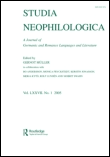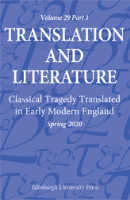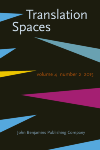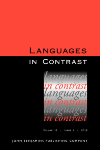
Translation & Interpreting-The International Journal of Translation and Interpreting
Scope & Guideline
Exploring the Art and Science of Translation and Interpreting
Introduction
Aims and Scopes
- Solidarity and Social Justice in Translation:
This area explores the role of translation and interpreting as acts of solidarity, particularly in contexts involving migration, crisis situations, and community support. It emphasizes the social impact of translation practices. - Quality and Methodology in Translation Studies:
The journal examines various methodologies for assessing translation and interpreting quality, including empirical studies, corpus analysis, and innovative teaching methods that enhance the skills of translators and interpreters. - Cultural and Linguistic Diversity:
Research in this scope focuses on the challenges and strategies related to translation across different cultures and languages, including the analysis of specific case studies that highlight the complexities of translating diverse linguistic phenomena. - Technological Integration in Translation and Interpreting:
The journal addresses the integration of technology in translation practices, including machine translation, subtitling, and the use of computer-assisted translation tools, exploring their implications for the profession. - Interdisciplinary Approaches to Translation:
The journal promotes interdisciplinary research that intersects with fields such as law, healthcare, and education, examining how translation and interpreting function within various professional domains.
Trending and Emerging
- Translation as a Tool for Solidarity:
There is a growing trend toward examining translation and interpreting as acts of solidarity, particularly in contexts involving migration and cultural integration, highlighting the social responsibility of language professionals. - Professional Development and Ethics in Translation:
Recent papers emphasize the importance of professional development, ethical considerations, and the role of translators and interpreters in ensuring equitable access to information and services, reflecting a heightened awareness of professional standards. - Impact of Technology on Translation Practices:
Research focusing on the implications of new technologies—such as AI, machine translation, and digital tools—on the practice and pedagogy of translation and interpreting is on the rise, indicating a significant shift towards understanding the future of the profession. - Community and Collaborative Translation Practices:
Emerging studies are increasingly exploring collaborative and community-based translation initiatives, revealing a trend towards participatory approaches that engage local communities in translation processes. - Interdisciplinary Research Integrating Diverse Fields:
The journal is witnessing an increase in interdisciplinary research that connects translation studies with fields such as healthcare, law, and education, enhancing the relevance and application of translation practices in various contexts.
Declining or Waning
- Traditional Linguistic Studies:
There is a noticeable decrease in research focusing solely on traditional linguistic analyses of translation, such as syntax and semantics, as scholars increasingly adopt more applied and interdisciplinary perspectives. - Focus on Literary Translation:
While still relevant, the emphasis on literary translation has diminished in favor of studies that address contemporary issues such as technology, ethics, and social justice, indicating a shift towards more pragmatic applications of translation. - Static Models of Translation Process:
Research employing static or overly simplified models of the translation process is declining, as more scholars seek to incorporate dynamic, cognitive, and sociocultural factors in their analyses.
Similar Journals

STUDIA NEOPHILOLOGICA
Innovative Perspectives on Language and PhilosophySTUDIA NEOPHILOLOGICA, published by Routledge Journals, Taylor & Francis Ltd, is a distinguished periodic publication that has been contributing to the fields of Linguistics and Philosophy since its inception in 1928. With an ISSN of 0039-3274 and E-ISSN 1651-2308, this journal is recognized within the academic community as an essential platform for innovative research and scholarship. It currently holds a Q3 quartile ranking in both Linguistics and Philosophy categories for 2023, further illustrating its relevance in a competitive landscape, where it ranks #465 out of 1088 in Scopus Ranks for Language and Linguistics. Although not openly accessible, the journal provides vital insights and analyses that push the boundaries of understanding language and its philosophical implications. With a coverage spanning from 1928 to 2024, STUDIA NEOPHILOLOGICA is indispensable for researchers, professionals, and students eager to expand their knowledge and engage with critical discussions in these disciplines.

Trans-Revista de Traductologia
Unveiling the Art and Science of TranslationTrans-Revista de Traductologia, an esteemed journal in the realm of Translation Studies and Linguistics, is published by the University of Malaga's Faculty of Philosophy and Letters. With an Open Access model since 2015, it facilitates the global dissemination of research and findings, supporting the academic community and enhancing visibility for scholars. The journal spans research from 2012 to 2023 and has achieved a commendable Q2 ranking in the Linguistics and Language category for 2023, signifying its growing influence within the field. Its Scopus rankings reflect its competitive edge, positioned at #484 in Arts and Humanities as well as #565 in Social Sciences, as it continues to foster a platform for innovative and interdisciplinary investigation in language dynamics, translation practices, and cultural exchanges. Scholars, professionals, and students alike will find a rich resource within its pages to explore both theoretical frameworks and practical applications in translation.

MonTI
Exploring Innovative Ideas in Language StudiesMonTI (ISSN: 1889-4178; E-ISSN: 1989-9335), published by UNIV JAUME I, stands as a pivotal journal in the domains of Education, Linguistics, and Language, based in Castellón de la Plana, Spain. With a notable impact factor reflected in its 2023 Scopus rankings—sitting in the Q1 quartile for Linguistics and Language—this journal is dedicated to advancing knowledge and research in these fields from 2014 to 2024. MonTI provides a platform for scholars and practitioners to disseminate innovative ideas and practices, ensuring open access for those interested in the intersection of language and education. Its robust ranking in arts and humanities and social sciences not only underscores its academic prestige but also emphasizes its relevance in fostering scholarly dialogue. Whether you are a researcher, educator, or student, MonTI offers rich resources and insights to enhance your understanding and practice in linguistics and education.

Translation and Literature
Illuminating the Art of Translation in LiteratureTranslation and Literature is a leading academic journal published by Edinburgh University Press, focusing on the intricate relationship between language and literature within the realms of translation studies. With an ISSN of 0968-1361 and an E-ISSN of 1750-0214, this journal provides a crucial platform for scholars and practitioners to explore and disseminate research that addresses both the theoretical and practical aspects of translation. Since its inception in 1996, Translation and Literature has established itself as an essential resource, particularly noted for its contributions to the fields of linguistics and literary theory, as indicated by its Q4 ranking in both categories in 2023. The journal's articles are designed to foster dialogue across disciplines, encouraging innovative thinking and collaboration among researchers, professionals, and students alike. Access to this valuable resource is currently available through subscription, ensuring high-quality scholarship reaches a diverse audience dedicated to advancing the understanding of translation's role in literature.

Quaderns-Revista de Traduccio
Cultivating Knowledge in the Heart of BarcelonaQuaderns-Revista de Traduccio, published by the Universitat Autònoma de Barcelona, is a prominent journal in the field of Linguistics and Language, which has garnered recognition for its scholarly contributions since its inception. With an ISSN of 1138-5790 and an E-ISSN of 2014-9735, this journal has maintained an active publication schedule across notable cycles, contributing valuable insights from 2011 to 2018 and continuing from 2020 to 2024. As a Q3 category journal in both Arts and Humanities and Social Sciences related to Language and Linguistics, it occupies an important niche, ranking #607 out of 1088 and #692 out of 1167 respectively. Though currently not an open-access journal, its rigorous peer-review process ensures that published articles meet high academic standards, making them relevant for researchers, professionals, and students alike. Housed in Cerdanyola del Vallès, Barcelona, this journal serves as a critical platform for the dissemination of cutting-edge translation studies and linguistics research.

Translation Spaces
Innovating Perspectives on Language and LiteratureTranslation Spaces is a premier academic journal dedicated to the interdisciplinary study of translation and its implications across various fields, including communication, linguistics, and literature. Published by John Benjamins Publishing Company, this journal is based in the Netherlands and boasts an impressive impact factor, reflecting its significance in the scholarly landscape, particularly within Q1 quartiles for Communication, Linguistics and Language, and Literature and Literary Theory as of 2023. Recognized for its commitment to advancing knowledge, Translation Spaces provides an essential platform for researchers, educators, and practitioners to explore innovative theoretical perspectives and empirical findings. With a comprehensive scope that spans from 2016 to 2024, the journal is indexed in Scopus, securing high ranks in both Arts and Humanities and Social Sciences, offering a 99th percentile rank in Literature and Literary Theory and maintaining a strong presence in Linguistics and Language. The absence of open access options ensures that the quality and integrity of published research are upheld, making it a valuable resource for the academic community engaged in translation studies.

Interpreter and Translator Trainer
Elevating Standards in Linguistics and EducationInterpreter and Translator Trainer, published by Routledge Journals, Taylor & Francis Ltd, is an esteemed academic journal dedicated to the fields of education, linguistics, and translation studies. With an ISSN of 1750-399X and E-ISSN 1757-0417, this journal has established itself as a leading platform for scholarly discourse and innovative research since its inception in 2007. Housed in the United Kingdom, it is recognized for its high academic standards, evidenced by its Q1 rankings in both Education and Linguistics for 2023. The journal explores significant developments in interpreter and translator training, providing a vital resource for researchers, educators, and practitioners striving to enhance their pedagogical frameworks and methodologies. With its impressive Scopus rankings reflecting a strong impact in the arts, humanities, and social sciences, Interpreter and Translator Trainer serves as an essential publication for those committed to advancing the understanding and practice of translation and interpreter education. The journal remains accessible via traditional subscription models, inviting contributions that push the boundaries of research and teaching in these interconnected fields.

Languages in Contrast
Dissecting Language: A Journey into Contrast and ComparisonLanguages in Contrast, a distinguished journal published by John Benjamins Publishing Co, serves as a vital platform in the field of linguistics, particularly focusing on the comparative study of languages. Operating under the ISSN 1387-6759 and E-ISSN 1569-9897, this journal has established its significance, achieving a commendable Q2 ranking in the 2023 Linguistics and Language category, indicative of its strong impact and reputation within the scientific community. With a Scopus ranking of #294 out of 1167, positioning it in the 74th percentile of its field, it consistently publishes high-quality research that explores the nuances and contrasting features of various languages, fostering deeper understanding and knowledge sharing among researchers, professionals, and students alike. While the journal is not open access, its rigorous peer-review process ensures that the contributions it includes are both insightful and groundbreaking, making it an invaluable resource for anyone invested in the study of languages. With coverage extending from 2008 to 2024, Languages in Contrast is poised to continue its pivotal role in advancing linguistic research and scholarship.

Journal of Specialised Translation
Exploring New Frontiers in Linguistic ResearchThe Journal of Specialised Translation is a leading publication dedicated to the field of translation studies, contributing to the academic discourse since its inception in 2004. Published by Roehampton University School of Arts in the United Kingdom, this Open Access journal facilitates the dissemination of high-quality research findings, making it accessible to scholars worldwide. With an impressive ranking of Q1 in Linguistics and Language and positioning in the 88th percentile across both Arts and Humanities and Social Sciences categories on Scopus, the journal commands a significant reputation in the domain. It serves as a vital platform for innovative theories, methodologies, and case studies in specialised translation, appealing to researchers, professionals, and students alike. By fostering a collaborative environment, the journal not only highlights emerging trends but also encourages rigorous debate around translation practices, ensuring that its contributions are relevant to contemporary challenges in the field.

Linguistica Antverpiensia New Series-Themes in Translation Studies
Exploring the Nexus of Language and TranslationLinguistica Antverpiensia New Series-Themes in Translation Studies is a premier academic journal dedicated to advancing the field of translation studies through innovative research and critical analysis. Published by ACADEMIC & SCIENTIFIC PUBLISHERS-ASP in Belgium, this journal features a diverse range of scholarly articles that explore the complex interplay between linguistics and translation, making it an essential resource for researchers, professionals, and students alike. With a noteworthy Q1 ranking in the categories of Linguistics and Language, it is positioned within the top 25% of journals in its field according to the latest 2023 Scopus rankings. The journal fosters an open dialogue on current themes and methodological advancements in translation, which contributes significantly to the academic discourse globally. Through its commitment to high-quality, peer-reviewed content, Linguistica Antverpiensia aims to cultivate a deeper understanding of language dynamics and their role in effective translation practices, ensuring its relevance in a rapidly evolving linguistic landscape.